- Home
- Robert E. Howard
Grim Lands Page 16
Grim Lands Read online
Page 16
Now he looked eastward, where the purple empire of Cathay dreamed away the centuries. Perhaps, with the waning of life’s tide, it was the old sleeping home-calling of his race; perhaps he remembered the ancient heroic khans, his ancestors, who had ridden southward out of the barren Gobi into the purple kingdoms.
The Grand Vizier shook his head, as he played at chess with his imperial master. He was old and weary, and he dared speak his mind even to Timour.
“My lord, of what avail these endless wars? You have already subjugated more nations than Genghis Khan or Alexander. Rest in the peace of your conquests and complete the work you have begun in Samarcand. Build more stately palaces. Bring here the philosophers, the artists, the poets of the world –”
Timour shrugged his massive shoulders.
“Philosophy and poetry and architecture are good enough in their way, but they are mist and smoke to conquest, for it is on the red splendor of conquest that all these things rest.”
The Vizier played with the ivory pawns, shaking his hoary head.
“My lord, you are like two men – one a builder, the other a destroyer.”
“Perhaps I destroy so that I may build on the ruins of my destruction,” the Amir answered. “I have never sought to reason out this matter. I only know that I am a conqueror before I am a builder, and conquest is my life’s blood.”
“But what reason to overthrow this great weak bulk of Cathay?” protested the Vizier. “It will mean but more slaughter, with which you have already crimsoned the earth – more wo and misery, with helpless people dying like sheep beneath the sword.”
Timour shook his head, half absently. “What are their lives? They die anyway, and their existence is full of misery. I will draw a band of iron about the heart of Tatary. With this Eastern conquest I will strengthen my throne, and kings of my dynasty shall rule the world for ten thousand years. All the roads of the world shall lead to Samarcand, and there shall be gathered the wonder and mystery and glory of the world – colleges and libraries and stately mosques – marble domes and sapphire towers and turquoise minarets. But first I shall carry out my destiny – and that is Conquest!”
“But winter draws on,” urged the Vizier. “At least wait until spring.”
Timour shook his head, unspeaking. He knew he was old; even his iron frame was showing signs of decay. And sometimes in his sleep he heard the singing of Aljai the Dark-eyed, the bride of his youth, dead for more than forty years. So through the Blue City ran the word, and men left their love-making and their wine-bibbing, strung their bows, looked to their harness and took up again the worn old road of conquest.
Timour and his chiefs took with them many of their wives and servants, for the Amir intended to halt at Otrar, his border city, and from thence strike into Cathay when the snows melted in the spring. Such of his lords as remained rode with him – war took a heavy toll of Timour’s hawks.
As usual Donald MacDeesa and his turbulent rogues led the advance. The Gael was glad to take the road after months of idleness, but he brought Zuleika with him. The years were growing more bitter for the giant Highlander, an outlander among alien races. His wild horsemen worshipped him in their savage way, but he was an alien among them, after all, and they could never understand his inmost thoughts. Ak Boga with his twinkling eyes and jovial laughter had been more like the men Donald had known in his youth, but Ak Boga was dead, his great heart stilled forever by the stroke of an Arab simitar, and in his growing loneliness Donald more and more sought solace in the Persian girl, who could never understand his strange wayward heart, but who somehow partly filled an aching void in his soul. Through the long lonely nights his hands sought her slim form with a dim formless unquiet hunger even she could dimly sense.
In a strange silence Timour rode out of Samarcand at the head of his long glittering columns and the people did not cheer as of old. With bowed heads and hearts crowded with emotions they could not define, they watched the last conqueror ride forth, and then turned again to their petty lives and commonplace, dreary tasks, with a vague instinctive sense that something terrible and splendid and awesome had gone out of their lives forever.
In the teeth of the rising winter the hosts moved, not with the speed of other times when they passed through the land like wind-blown clouds. They were two hundred thousand strong and they bore with them herds of spare horses, wagons of supplies and great tent-pavilions.
Beyond the pass men call the Gates of Timour, snow fell, and into the teeth of the blizzard the army toiled doggedly. At last it became apparent that even Tatars could not march in such weather, and Prince Khalil went into winter quarters in that strange town called the Stone City, but Timour plunged on with his own troops. Ice lay three feet deep on the Syr when they crossed, and in the hill-country beyond the going became fiercer, and horses and camels stumbled through the drifts, the wagons lurching and rocking. But the will of Timour drove them grimly onward, and at last they came upon the plain and saw the spires of Otrar gleaming through the whirling snow-wrack.
Timour installed himself and his nobles in the palace, and his warriors went thankfully into winter quarters. But he sent for Donald MacDeesa.
“Ordushar lies in our road,” said Timour. “Take two thousand men and storm that city that our road be clear to Cathay with the coming of spring.”
When a man casts a javelin he little cares if it splinter on the mark. Timour would not have sent his valued emirs and chosen warriors on this, the maddest quest he had yet given even Donald. But the Gael cared not; he was more than ready to ride on any adventure which might drown the dim bitter dreams that gnawed deeper and deeper at his heart. At the age of forty MacDeesa’s iron frame was unweakened, his ferocious valor undimmed. But at times he felt old in his heart. His thoughts turned more and more back over the black and crimson pattern of his life with its violence and treachery and savagery; its wo and waste and stark futility. He slept fitfully and seemed to hear half-forgotten voices crying in the night. Sometimes it seemed the keening of Highland pipes skirled through the howling winds.
He roused his wolves, who gaped at the command but obeyed without comment, and rode out of Otrar in a roaring blizzard. It was a venture of the damned.
In the palace of Otrar, Timour drowsed on his divan over his maps and charts, and listened drowsily to the everlasting disputes between the women of his household. The intrigues and jealousies of the Samarcand palaces reached to isolated Otrar. They buzzed about him, wearying him to death with their petty spite. As age stole on the iron Amir, the women looked eagerly to his naming of a successor – his queen Sarai Mulkh Khanum; Khan Zade, wife of his dead son Jahangir. Against the queen’s claim for her son – and Timour’s – Shah Ruhk, was opposed the intrigue of Khan Zade for her son, Prince Khalil, whom the courtezan Shadi Mulkh wrapped about her pink finger.
The Amir had brought Shadi Mulkh with him to Otrar, much against Khalil’s will. The Prince was growing restless in the bleak Stone City and hints reached Timour of discord and threats of insubordination. Sarai Khanum came to the Amir, a gaunt weary woman, grown old in wars and grief.
“The Persian girl sends secret messages to Prince Khalil, stirring him up to deeds of folly,” said the Great Lady. “You are far from Samarcand. Were Khalil to march thither before you – there are always fools ready to revolt, even against the Lord of Lords.”
“At another time,” said Timour wearily, “I would have her strangled. But Khalil in his folly would rise against me, and a revolt at this time, however quickly put down, would upset all my plans. Have her confined and closely guarded, so that she can send no more messages.”
“This I have already done,” replied Sarai Khanum grimly, “but she is clever and manages to get messages out of the palace by means of the Persian girl of the Caphar, lord Donald.”
“Fetch this girl,” ordered Timour, laying aside his maps with a sigh.
They dragged Zuleika before the Amir, who looked somberly upon her as she grovelled whimpering
at his feet, and with a weary gesture, sealed her doom – and immediately forgot her, as a king forgets the fly he has crushed.
They dragged the girl screaming from the imperial presence and hurled her upon her knees in a hall which had no windows and only bolted doors. Grovelling on her knees she wailed frantically for Donald and screamed for mercy, until terror froze her voice in her pulsing throat, and through a mist of horror she saw the stark half-naked figure and the mask-like face of the grim executioner advancing, knife in hand.…
Zuleika was neither brave nor admirable. She neither lived with dignity nor met her fate with courage. She was cowardly, immoral and foolish. But even a fly loves life, and a worm would cry out under the heel that crushed it. And perhaps, in the grim inscrutable books of Fate, even an emperor may not forever trample insects with impunity.
VIII
But I have dreamed a dreary dream,
Beyond the Vale of Skye;
I saw a dead man win a fight,
And I think that man was I.
– Battle of Otterbourne
And at Ordushar the siege dragged on. In the freezing winds that swept down the pass, driving snow in blinding, biting blasts, the stocky Kalmucks and the lean Vigurs strove and suffered and died in bitter anguish. They set scaling-ladders against the walls and struggled upward, and the defenders, suffering no less, speared them, hurled down boulders that crushed the mailed figures like beetles, and thrust the ladders from the walls so that they crashed down, bearing death to men below. Ordushar was actually but a stronghold of the Jat Mongols, set sheer in the pass and flanked by towering cliffs.
Donald’s wolves hacked at the frozen ground with frost-bitten raw hands which scarce could hold the picks, striving to sink a mine under the walls. They pecked at the towers while molten lead and weighted javelins fell in a rain upon them; driving their spear-points between the stones, tearing out pieces of masonry with their naked hands. With stupendous toil they had constructed makeshift siege-engines from felled trees and the leather of their harness and woven hair from the manes and tails of their war-horses. The rams battered vainly at the massive stones, the ballistas groaned as they launched tree-trunks and boulders against the towers or over the walls. Along the parapets the attackers fought with the defenders, until their bleeding hands froze to spear-shaft and sword-hilt, and the skin came away in great raw strips. And always, with superhuman fury rising above their agony, the defenders hurled back the attack.
A storming-tower was built and rolled up to the walls, and from the battlements the men of Ordushar poured a drenching torrent of naphtha that sent it up in flame and burnt the men in it, shriveling them in their armor like beetles in a fire. Snow and sleet fell in blinding flurries, freezing to sheets of ice. Dead men froze stiffly where they fell, and wounded men died in their sleeping-furs. There was no rest, no surcease from agony. Days and nights merged into a hell of pain. Donald’s men, with tears of suffering frozen on their faces, beat frenziedly against the frosty stone walls, fought with raw hands gripping broken weapons, and died cursing the gods that created them.
The misery inside the city was no less, for there was no more food. At night Donald’s warriors heard the wailing of the starving people in the streets. At last in desperation the men of Ordushar cut the throats of their women and children and sallied forth, and the haggard Tatars fell on them weeping with the madness of rage and wo, and in a welter of battle that crimsoned the frozen snow, drove them back through the city gates. And the struggle went hideously on.
Donald used up the last wood in the vicinity to erect another storming-tower higher than the city-wall. After that there was no more wood for the fires. He himself stood at the uplifted bridge which was to be lowered to rest on the parapets. He had not spared himself. Day and night he had toiled beside his men, suffering as they had suffered. The tower was rolled to the wall in a hail of arrows that slew half the warriors who had not found shelter behind the thick bulwark. A crude cannon bellowed from the walls, but the clumsy round shot whistled over their heads. The naphtha and Greek fire of the Jats was exhausted. In the teeth of the singing shafts the bridge was dropped.
Drawing his claymore, Donald strode out upon it. Arrows broke on his corselet and glanced from his helmet. Firelocks flashed and bellowed in his face but he strode on unhurt. Lean armored men with eyes like mad dogs’ swarmed upon the parapet, seeking to dislodge the bridge, to hack it asunder. Among them Donald sprang, his claymore whistling. The great blade sheared through mail-mesh, flesh and bone, and the struggling clump fell apart. Donald staggered on the edge of the wall as a heavy ax crashed on his shield, and he struck back, cleaving the wielder’s spine. The Gael recovered his balance, tossing away his riven shield. His wolves were swarming over the bridge behind him, hurling the defenders from the parapet, cutting them down. Into a swirl of battle Donald strode, swinging his heavy blade. He thought fleetingly of Zuleika, as men in the madness of battle will think of irrelevant things, and it was as if the thought of her had hurt him fiercely under the heart. But it was a spear that had girded through his mail, and Donald struck back savagely; the claymore splintered in his hand and he leaned against the parapet, his face briefly contorted. Around him swept the tides of slaughter as the pent-up fury of his warriors, maddened by the long weeks of suffering, burst all bounds.
IX
While the red flashing of the light
From clouds that hung, like banners, o’er,
Appeared to my half-closing eye
The pageantry of monarchy.
– Poe, Tamerlane
To Timour on his throne in the palace of Otrar came the Grand Vizier. “The survivors of the men sent to the Pass of Ordushar are returning, my lord. The city in the mountains is no more. They bear the lord Donald on a litter, and he is dying.”
They brought the litter into Timour’s presence, weary, dull-eyed men, with raw wounds tied up with blood-crusted rags, their garments and mail in tatters. They flung before the Amir’s feet the golden-scaled corselets of chiefs, and chests of jewels and robes of silk and silver braid; the loot of Ordushar where men had starved among riches. And they set the litter down before Timour.
The Amir looked at the form of Donald. The Highlander was pale, but his sinister face showed no hint of weakness in that wild spirit, his cold eyes gleamed unquenched.
“The road to Cathay is clear,” said Donald, speaking with difficulty. “Ordushar lies in smoking ruins. I have carried out your last command.”
Timour nodded, his eyes seeming to gaze through and beyond the Highlander. What was a dying man on a litter to the Amir, who had seen so many die? His mind was on the road to Cathay and the purple kingdoms beyond. The javelin had shattered at last, but its final cast had opened the imperial path. Timour’s dark eyes burned with strange depths and leaping shadows, as the old fire stole through his blood. Conquest! Outside the winds howled, as if trumpeting the roar of nakars, the clash of cymbals, the deep-throated chant of victory.
“Send Zuleika to me,” the dying man muttered. Timour did not reply; he scarcely heard, sitting lost in thunderous visions. He had already forgotten Zuleika and her fate. What was one death in the awesome and terrible scheme of empire.
“Zuleika, where is Zuleika?” the Gael repeated, moving restlessly on his litter. Timour shook himself slightly and lifted his head, remembering.
“I had her put to death,” he answered quietly. “It was necessary.”
“Necessary!” Donald strove to rear upright, his eyes terrible, but fell back, gagging, and spat out a mouthful of crimson. “You bloody dog, she was mine!”
“Yours or another’s,” Timour rejoined absently, his mind far away. “What is a woman in the plan of imperial destinies?”
For answer Donald plucked a pistol from among his robes and fired point-blank. Timour started and swayed on his throne, and the courtiers cried out, paralyzed with horror. Through the drifting smoke they saw that Donald lay dead on the litter, his thin lips frozen in a
grim smile. Timour sat crumpled on his throne, one hand gripping his breast; through those fingers blood oozed darkly. With his free hand he waved back his nobles.
“Enough; it is finished. To every man comes the end of the road. Let Pir Muhammad reign in my stead, and let him strengthen the lines of the empire I have reared with my hands.”
A rack of agony twisted his features. “Allah, that this should be the end of empire!” It was a fierce cry of anguish from his inmost soul. “That I, who have trodden upon kingdoms and humbled sultans, come to my doom because of a cringing trull and a Caphar renegade!” His helpless chiefs saw his mighty hands clench like iron as he held death at bay by the sheer power of his unconquered will. The fatalism of his accepted creed had never found resting-place in his instinctively pagan soul; he was a fighter to the red end.
“Let not my people know that Timour died by the hand of a Caphar,” he spoke with growing difficulty. “Let not the chronicles of the ages blazon the name of a wolf that slew an emperor. Ah God, that a bit of dust and metal can dash the Conqueror of the World into the dark! Write, scribe, that this day, by the hand of no man, but by the will of Allah, died Timour, Servant of God.”
The chiefs stood about in dazed silence, while the pallid scribe took up parchment and wrote with a shaking hand. Timour’s somber eyes were fixed on Donald’s still features that seemed to give back his stare, as the dead on the litter faced the dying on the throne. And before the scratching of the quill had ceased, Timour’s lion head had sunk upon his mighty chest. And without the wind howled a dirge, drifting the snow higher and higher about the walls of Otrar, even as the sands of oblivion drifted already about the crumbling empire of Timour, the Last Conqueror, Lord of the World.

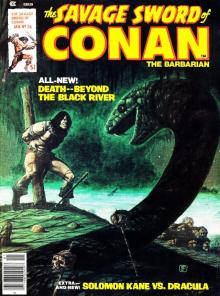 Beyond the Black River
Beyond the Black River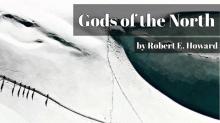 Gods of the North
Gods of the North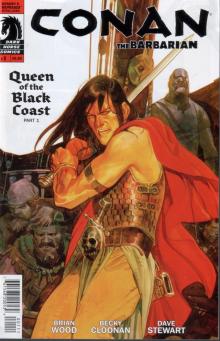 Queen of the Black Coast
Queen of the Black Coast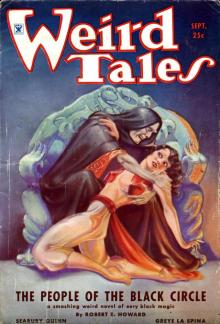 The People of the Black Circle
The People of the Black Circle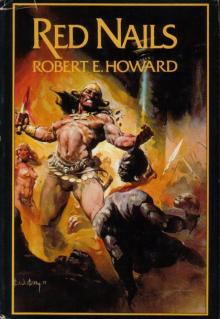 Red Nails
Red Nails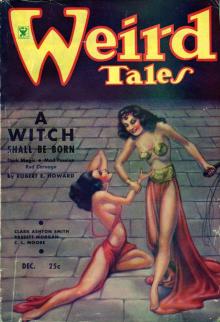 A Witch Shall Be Born
A Witch Shall Be Born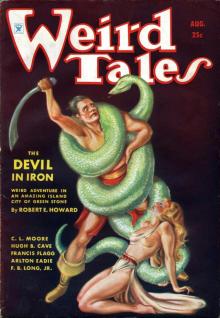 The Devil in Iron
The Devil in Iron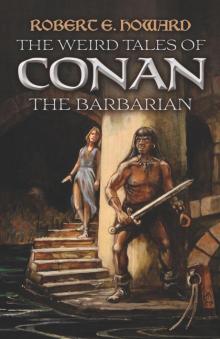 The Weird Tales of Conan the Barbarian
The Weird Tales of Conan the Barbarian The Bloody Crown of Conan
The Bloody Crown of Conan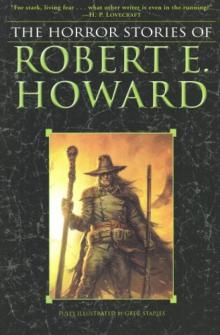 The Horror Stories of Robert E. Howard
The Horror Stories of Robert E. Howard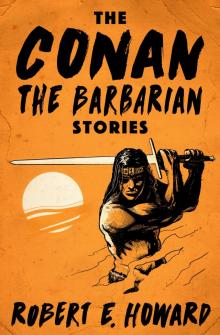 Conan the Conqueror
Conan the Conqueror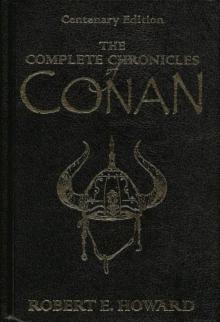 Conan the Barbarian
Conan the Barbarian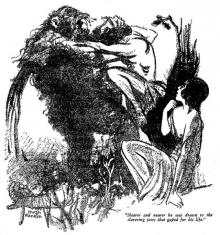 Shadows in the Moonlight
Shadows in the Moonlight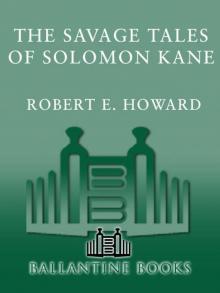 The Savage Tales of Solomon Kane
The Savage Tales of Solomon Kane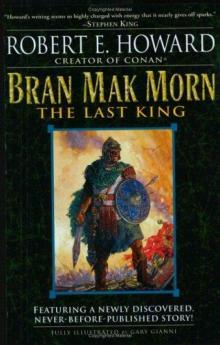 Bran Mak Morn: The Last King
Bran Mak Morn: The Last King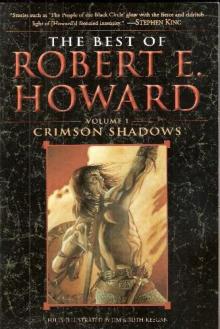 The Best of Robert E. Howard Volume One: Crimson Shadows
The Best of Robert E. Howard Volume One: Crimson Shadows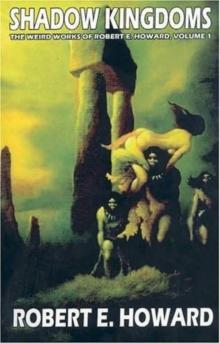 The Best of Robert E. Howard: Crimson Shadows (Volume 1)
The Best of Robert E. Howard: Crimson Shadows (Volume 1)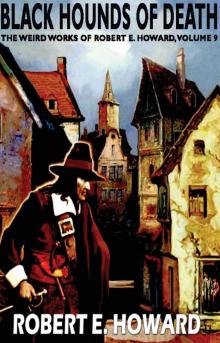 Black Hounds of Death
Black Hounds of Death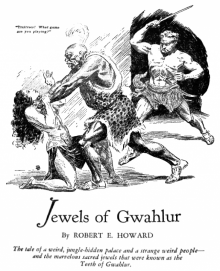 Jewels of Gwahlur
Jewels of Gwahlur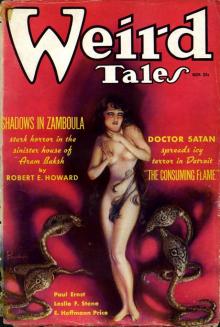 Shadows in Zamboula
Shadows in Zamboula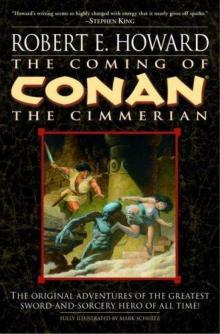 The Coming of Conan the Cimmerian
The Coming of Conan the Cimmerian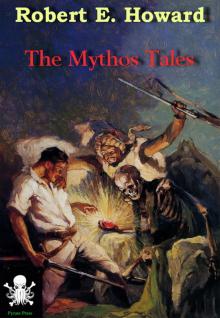 The Mythos Tales
The Mythos Tales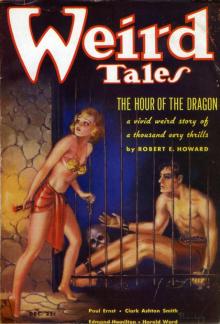 The Hour of the Dragon
The Hour of the Dragon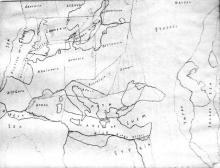 The Hyborian Age
The Hyborian Age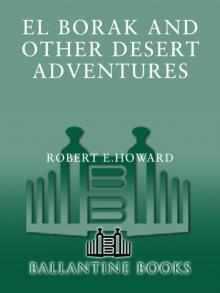 El Borak and Other Desert Adventures
El Borak and Other Desert Adventures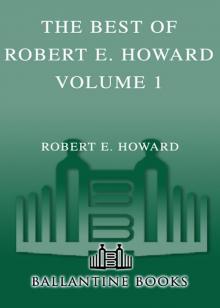 The Best of Robert E. Howard Volume 1 The Best of Robert E. Howard Volume 1
The Best of Robert E. Howard Volume 1 The Best of Robert E. Howard Volume 1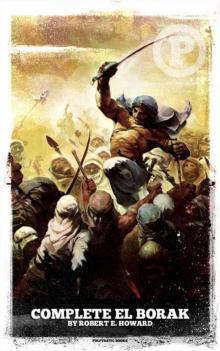 El Borak: The Complete Tales
El Borak: The Complete Tales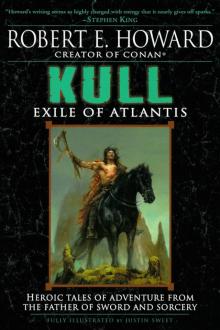 Kull: Exile of Atlantis
Kull: Exile of Atlantis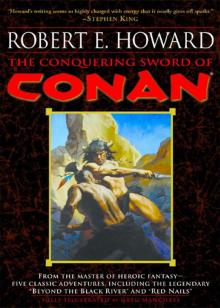 The Conquering Sword of Conan
The Conquering Sword of Conan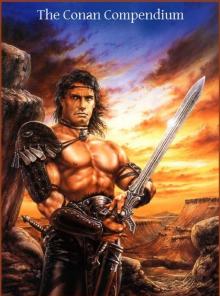 The Conan Compendium
The Conan Compendium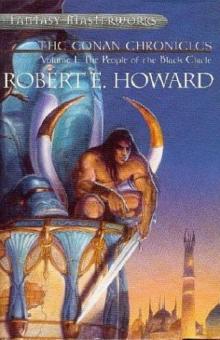 The Conan Chronicles: Volume 1: The People of the Black Circle
The Conan Chronicles: Volume 1: The People of the Black Circle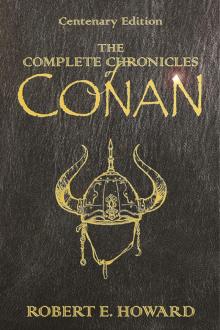 The Complete Chronicles of Conan: Centenary Edition
The Complete Chronicles of Conan: Centenary Edition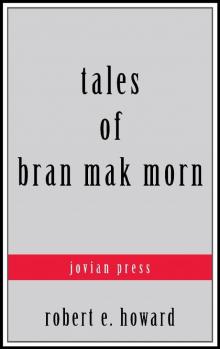 Tales of Bran Mak Morn (Serapis Classics)
Tales of Bran Mak Morn (Serapis Classics)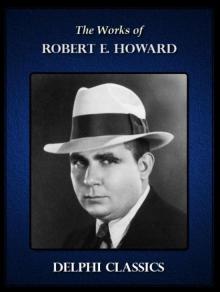 Delphi Works of Robert E. Howard (Illustrated) (Series Four)
Delphi Works of Robert E. Howard (Illustrated) (Series Four)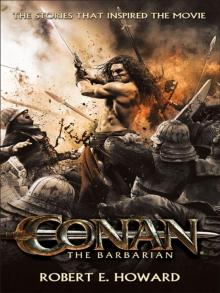 Conan the Barbarian: The Stories That Inspired the Movie
Conan the Barbarian: The Stories That Inspired the Movie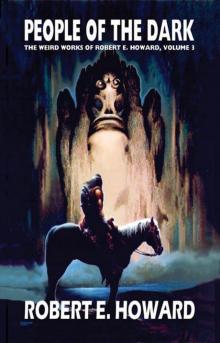 People of the Dark Robert Ervin Howard
People of the Dark Robert Ervin Howard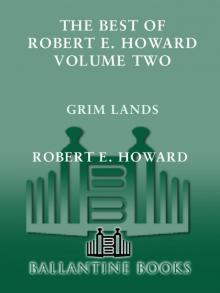 Grim Lands
Grim Lands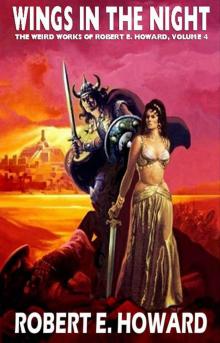 Wings in the Night
Wings in the Night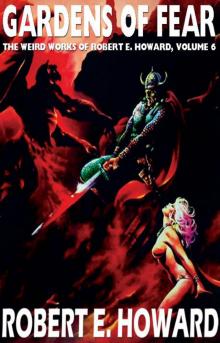 Gardens of Fear
Gardens of Fear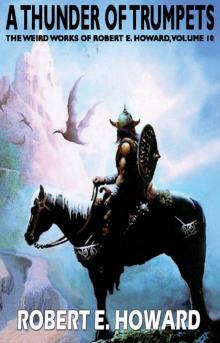 A Thunder of Trumpets
A Thunder of Trumpets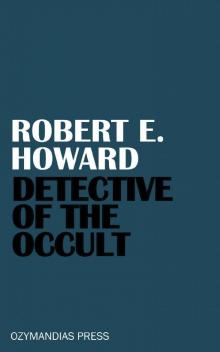 Detective of the Occult
Detective of the Occult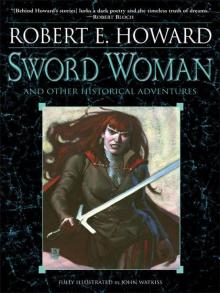 Sword Woman and Other Historical Adventures
Sword Woman and Other Historical Adventures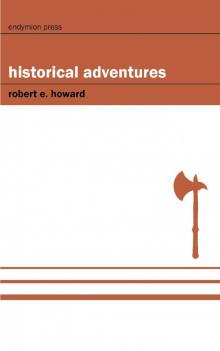 Historical Adventures
Historical Adventures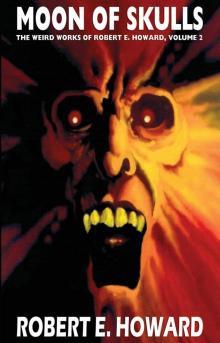 Moon of Skulls
Moon of Skulls The Robert E. Howard Omnibus: 97 Collected Stories
The Robert E. Howard Omnibus: 97 Collected Stories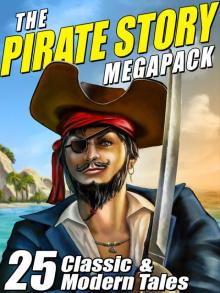 The Pirate Story Megapack: 25 Classic and Modern Tales
The Pirate Story Megapack: 25 Classic and Modern Tales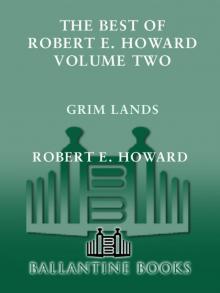 The Best of Robert E. Howard, Volume 2
The Best of Robert E. Howard, Volume 2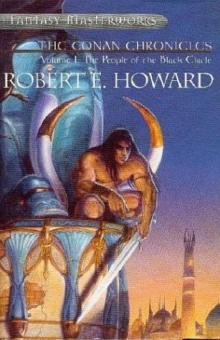 The Conan Chronicles, Vol. 1: The People of the Black Circle
The Conan Chronicles, Vol. 1: The People of the Black Circle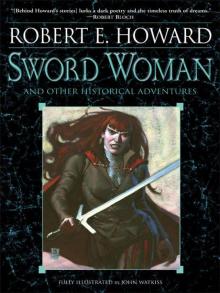 Sword Woman and Other Historical Adventures M
Sword Woman and Other Historical Adventures M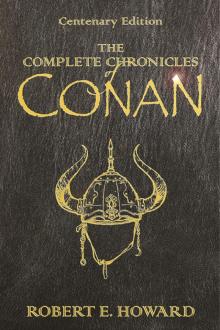 The Complete Chronicles of Conan
The Complete Chronicles of Conan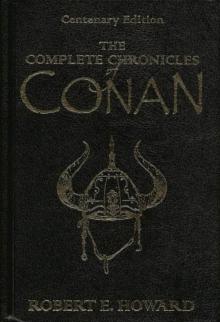 Conan the Barbarian: The Chronicles of Conan (collected short stories)
Conan the Barbarian: The Chronicles of Conan (collected short stories)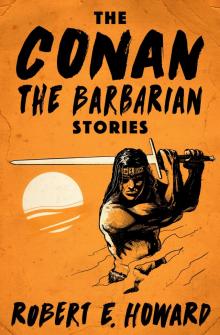 The Conan the Barbarian Stories
The Conan the Barbarian Stories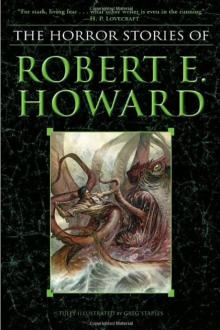 The Best Horror Stories of
The Best Horror Stories of Tigers Of The Sea cma-4
Tigers Of The Sea cma-4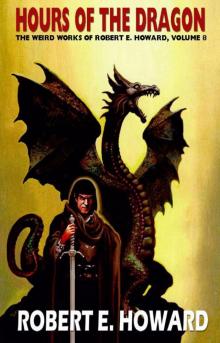 The Hours of the Dragon
The Hours of the Dragon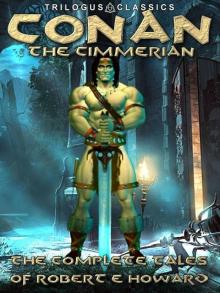 Conan the Cimmerian: The Complete Tales (Trilogus Classics)
Conan the Cimmerian: The Complete Tales (Trilogus Classics)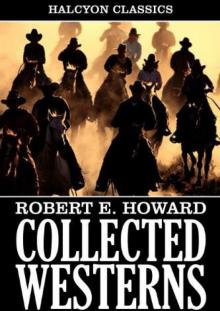 Collected Western Stories of Robert E. Howard (Unexpurgated Edition) (Halcyon Classics)
Collected Western Stories of Robert E. Howard (Unexpurgated Edition) (Halcyon Classics)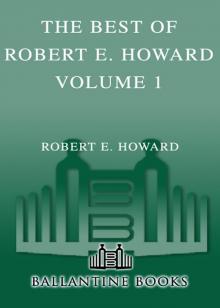 The Best of Robert E. Howard, Volume 1
The Best of Robert E. Howard, Volume 1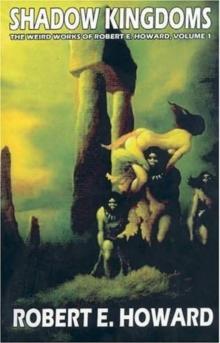 Shadow Kingdoms
Shadow Kingdoms